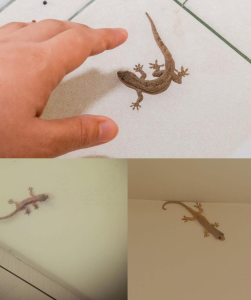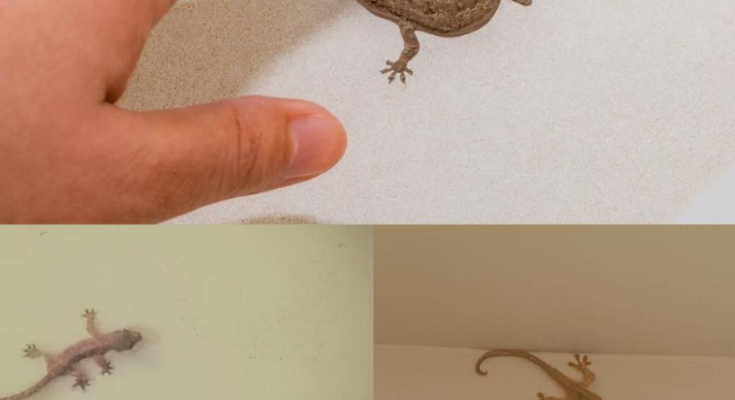Hearing a lizard squeaking inside your home can be an unusual and slightly startling experience, particularly because lizards are not typically associated with vocal sounds. While many people may assume that lizards are silent creatures, certain species are indeed capable of producing noises, and these sounds can convey different types of information. Understanding what a lizard squeak might mean requires looking at biological, environmental, and symbolic perspectives, as well as practical considerations for your home.
From a biological standpoint, lizards are capable of making sounds for a variety of reasons. Although they are not as vocally expressive as birds or mammals, certain species, particularly geckos, are known to produce chirps, clicks, or squeaks. For instance, house geckos, which are common in many regions, often make high-pitched squeaks as part of their natural communication. These sounds serve multiple functions, such as establishing territory, attracting mates, or signaling distress. If you hear a squeak in your home, it is often a gecko expressing itself—perhaps claiming a corner of your ceiling or wall as its territory or responding to another nearby lizard.
In addition to communication, a squeaking lizard may be expressing fear or discomfort. Lizards are prey animals, and they have evolved various ways to respond to threats. When a lizard feels threatened by a sudden movement, loud noise, or human presence, it may squeak as a defensive signal. This sound can serve to startle potential predators, giving the lizard a chance to escape. In a household setting, a squeaking lizard may have been startled by your presence, a pet, or an environmental change such as lights turning on suddenly or a door slamming. The squeak is not necessarily a call for attention; it is often an instinctive reaction to perceived danger.
Another common explanation involves the physical limitations of lizards themselves. Many species have a vocal structure that can only produce short, sharp sounds. These noises are often intermittent, meaning that the squeak might occur only occasionally or in bursts. Homeowners may notice these sounds particularly at night because lizards, like geckos, are often nocturnal or crepuscular, becoming more active during the evening hours. The squeaking might coincide with their hunting for insects or patrolling their territory within your home. If you have bright outdoor lights or indoor lamps attracting insects, your home may become an unintended lizard habitat, increasing the chances of hearing these vocalizations.
Environmental factors can also influence lizard behavior and vocalization. Temperature, humidity, and availability of food all affect how active a lizard is and how likely it is to make sounds. Warm, humid climates often support a larger population of small lizards inside homes, especially in regions where outdoor conditions are conducive to their survival. If your home provides shelter, warmth, and a steady supply of insects, lizards may become comfortable enough to vocalize more freely, resulting in squeaks that alert you to their presence. Additionally, seasonal changes may play a role. In breeding seasons, male lizards may become more vocal as they assert dominance or attempt to attract females. This behavior can explain a sudden increase in squeaking sounds during certain times of the year.
From a symbolic perspective, many cultures assign meaning to the presence of lizards in the home. In some traditions, a lizard entering a living space is considered a sign of change, vigilance, or a shift in energy. A squeaking lizard, in particular, may be interpreted as a warning or alert. While these symbolic interpretations are subjective, they often reflect the natural human tendency to associate animal behavior with broader life events. The squeak can be perceived as a gentle reminder to pay attention to your surroundings, assess potential threats, or consider changes in your environment.
Practically speaking, a squeaking lizard in the house may indicate that the home environment is suitable for lizards and other small creatures. Lizard activity often signals the presence of insects, which serve as their primary food source. If you are hearing squeaks at night, it could imply that your home has enough insect activity to sustain lizard populations. While this is not necessarily harmful, it may prompt homeowners to evaluate cleanliness, lighting, and insect prevention measures. Addressing these factors can reduce the likelihood of lizards congregating in specific areas, which may, in turn, reduce the squeaking sounds.
In terms of safety and care, it is important to understand that most lizards are harmless to humans. The squeak itself is not an indication of danger. However, it is wise to observe the animal from a safe distance and ensure that pets or small children do not provoke it, as sudden handling may stress the lizard. Stress can trigger more frequent squeaking or defensive behavior. If the squeaking persists or the lizard seems trapped, it may be best to gently guide it back outside using humane methods, such as encouraging it to leave through an open window or using a soft container. Avoid using pesticides or harsh chemicals, as these can harm both the lizard and other wildlife in your home.
Interestingly, the presence of a squeaking lizard can also serve as an ecological indicator. Lizards are sensitive to environmental changes, and their activity levels can reflect the state of your local ecosystem. Frequent sightings or sounds may indicate that your neighborhood supports a healthy insect population and a balanced food web. Conversely, a sudden absence of lizard activity in an area where they were previously common could signal environmental stressors, such as chemical use, habitat loss, or extreme weather conditions.
In conclusion, a lizard squeaking in your house is usually a natural phenomenon with biological, environmental, and symbolic explanations. Biologically, it is often a gecko or other vocal lizard expressing territory, communication, or distress. Environmentally, it can reflect favorable conditions inside your home, including warmth, shelter, and food availability. Symbolically, cultures may interpret the presence and sounds of lizards as signs of vigilance or impending change. Practically, the squeak serves as a reminder to maintain a clean home environment while appreciating the harmless wildlife sharing your space. Understanding the reasons behind the squeak can transform initial surprise into curiosity and respect for the small creatures that inhabit our surroundings. Rather than fearing or ignoring the sound, observing and interpreting it can provide insight into both your home and the natural behaviors of lizards.
In short, the squeak is not a cause for alarm—it is a small, natural communication from a creature that has adapted to coexist with humans in shared spaces. It invites awareness and a gentle curiosity about the hidden life within our homes, reminding us that even the tiniest sounds can carry meaning, connection, and a glimpse into the intricate web of the natural world.


